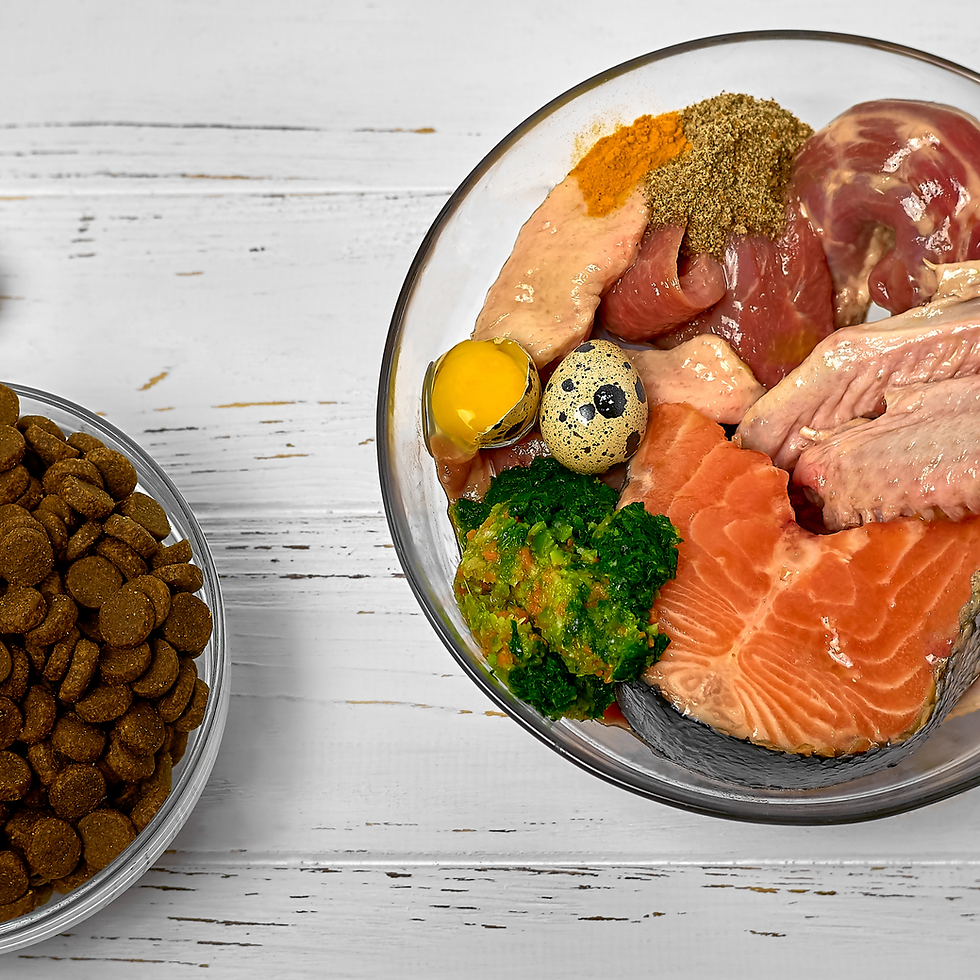Why Dogs Don't Need Carbohydrates: Exploring Canine Nutrition
- Storms Raw

- Jun 9, 2023
- 3 min read
When it comes to the dietary needs of dogs, there are misconceptions surrounding the necessity of carbohydrates. While humans rely on carbohydrates for energy, dogs have a different physiological makeup. In this blog post, I will delve into the reasons why dogs don't require carbohydrates as a vital component of their diet. I have also included the science below too.

Carnivorous Evolution:
Dogs are descendants of carnivorous ancestors, which has shaped their nutritional requirements. Their digestive systems have evolved to efficiently process and extract nutrients from animal-based food sources (1). This adaptation reflects their reliance on proteins and fats as the primary sources of energy.
Metabolic Adaptations:
Dogs possess specific metabolic adaptations that support their carnivorous nature. Unlike humans, dogs have a relatively short digestive tract, which limits their ability to break down and absorb carbohydrates effectively (2). Their bodies prioritize the digestion and utilization of proteins and fats.
Protein as a Vital Nutrient:
Proteins are indispensable for dogs as they provide essential amino acids necessary for various physiological functions. Amino acids are the building blocks of proteins and are crucial for tissue repair, enzyme production, hormone synthesis, and immune system support (3). Animal-based proteins, such as those found in meat, poultry, and fish, offer a complete profile of essential amino acids that fulfill a dog's nutritional requirements.
Fat as an Energy Source:
Fats are an excellent source of concentrated energy for dogs. They provide a highly efficient energy source, as they contain more than twice the calories per gram compared to carbohydrates or proteins (4). Furthermore, fats contribute to the absorption of fat-soluble vitamins and provide essential fatty acids, such as omega-3 and omega-6, which are vital for a dog's skin, coat, and overall health (5).
Limited Ability to Digest Carbohydrates:
Although dogs can digest some carbohydrates, their digestive systems are not optimized for processing plant-based materials. Dogs lack certain digestive enzymes, such as salivary amylase, which is responsible for the initial breakdown of complex carbohydrates (6). Their bodies are designed to prioritize the digestion and absorption of proteins and fats.
Health Implications:
Excessive consumption of carbohydrates in a dog's diet can lead to various health concerns. High-carbohydrate diets can contribute to weight gain and obesity in dogs, which can lead to a host of associated problems, including diabetes and joint issues (7). Additionally, some dogs may develop sensitivities or allergies to certain carbohydrates, leading to digestive disorders and skin irritations (8).
While carbohydrates may be present in some commercial dog foods as a source of energy and to bind kibble, they are not a necessary component of a dog's diet. Dogs have evolved as carnivorous animals, adapted to thrive on diets rich in animal-based proteins and fats. The focus should be on providing high-quality, species-appropriate nutrition that prioritizes these essential macronutrients. We can help ensure that your dog's dietary needs are met appropriately.
References: ( the science bit)
1. Case, L. P., Daristotle, L., Hayek, M. G., & Raasch, M. F. (2011). Canine and Feline Nutrition: A Resource for Companion Animal Professionals (3rd ed.). Mosby.
2. Verbrugghe, A., & Hesta, M. (2017). Cats and Dogs: The Carnivore Connection. Veterinary Sciences, 4(3), 33.
3. National Research Council (US) Subcommittee on Dog and Cat Nutrition. (2006). Nutrient Requirements of Dogs and Cats. National Academies Press.
4. Hand, M. S., Thatcher, C. D., Remillard, R. L., & Roudebush, P. (Eds.). (2010). Small Animal Clinical Nutrition (5th ed.). Mark Morris Institute.
5. Bauer, J. E. (2006). Fatty acids in nutrition of cats and dogs. In The Journal of Nutrition, 136(7 Suppl), 1947S–1951S.
6. Bosch, G., Hagen-Plantinga, E. A., & Hendriks, W. H. (2015). Dietary Carbohydrate Composition Influences Molecular Transporter Systems in the Small Intestine of Cats and Dogs. The Journal of Nutrition, 145(10), 2307–2314.
7. German, A. J. (2006). The Growing Problem of Obesity in Dogs and Cats. The Journal of Nutrition, 136(7 Suppl), 1940S–1946S.
8. Olivry, T., Mueller, R. S., & Prelaud, P. (Eds.). (2015). Advances in Veterinary Dermatology, Volume 8. John Wiley & Sons.






Comments